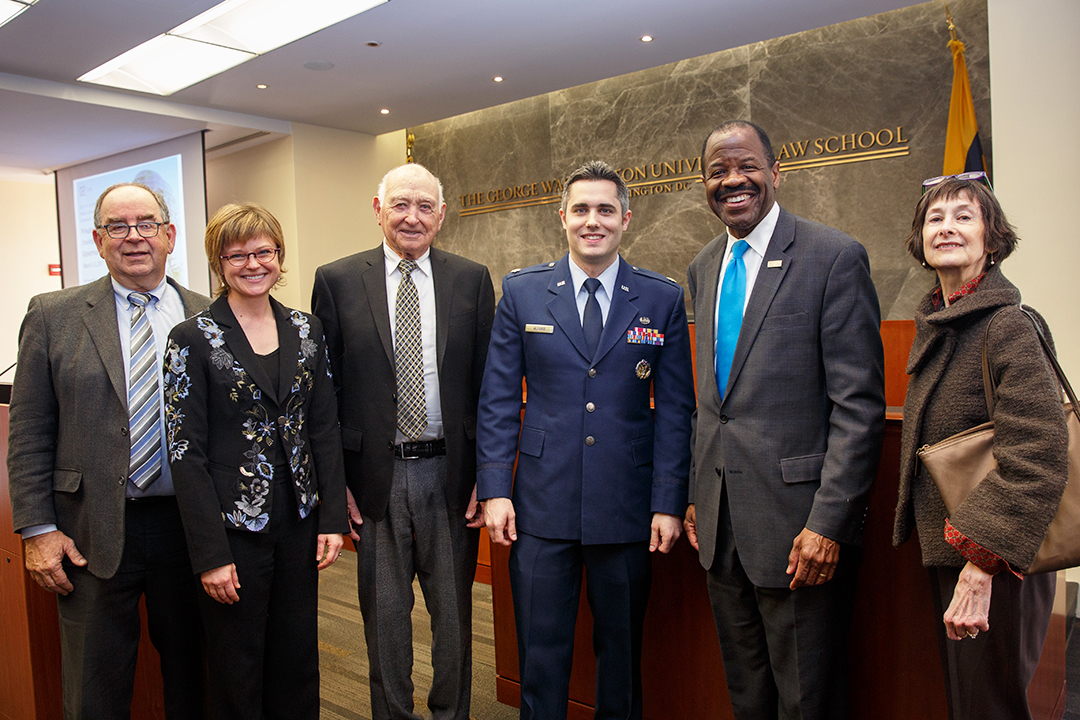Thomas Alford, LLM '16, was recently presented with the 2017 Jamie Grodsky Prize for Environmental Law Scholarship. The prize, which commemorates the life of Professor Jamie A. Grodsky, recognizes an original paper by a GW Law student in the environmental field as judged by a panel.
Major Alford, a JAG officer in the U.S. Air Force, submitted his paper in partial satisfaction of the requirements for the degree of Master of Laws in Government Procurement and Environmental Law. The winning paper, "Off the Grid: Facilitating the Acquisition of Microgrids for Military Installations to Achieve Energy Security and Sustainability," discussed the process for obtaining energy security for key Department of Defense (DoD) facilities.
The Grodsky Prize was presented in conjunction with the annual J.B. and Maurice C. Shapiro Environmental Law Conference. The Grodsky family attended the event. On the day of the ceremony, Major Alford shared that he had a memorable experience learning about the life and career of Professor Grodsky, who passed away in May 2010. "She was truly an amazing lawyer and professor and, by all accounts, a terrific person. I'm very much honored to have received an award bearing her name. I'm not sure I'm worthy of the honor, but I'm glad this important issue is receiving more attention," he said.
About "Off the Grid"
When Major Alford learned about high-profile failures in the electrical grid, particularly the 2013 sniper attack on the Pacific Gas and Electric Company's Transmission Substation in California, he was inspired and wanted to learn more about the topic of energy security. The attack knocked out power for all of Silicon Valley and caused about $15 million worth of damages. "Because I'm a military officer, I began to think of the military ramifications of relying upon such a fragile and dated civilian power grid, and the more I researched, the more I learned that others—including many folks high in the federal government—were sounding the alarm that the DoD is far too reliant upon the civilian electrical grid for its energy needs. Even now, the DoD relies on the civilian grid for about 98% of its power," he said.
"The paper argues that the DoD can kill two birds with one stone. For one, the paper attempts to facilitate the DoD's acquisition of microgrids and decentralized power generation facilities, which are technologies that allow the DoD's core assets to 'island' and function on their own in the event of a catastrophic failure of the civilian power grid. I try to help navigate through some of the procurement and environmental regulatory hurdles DoD faces. And, second, I argue that, in the process of obtaining energy security for key DoD facilities, the DoD would also become more and more dependent upon 'clean' energy produced on or near its bases. Those clean energy sources include wind, solar, thermal energy, energy storage, and a new technology called 'modular nuclear reactors,' which are still in development, but are far safer than traditional nuclear power. That shift towards clean energy, of course, benefits the environment overall since the DoD consumes over one percent of the nation's power."
––Major Thomas Alford
The views expressed in this story are solely those of the author and do not reflect the official policy or position of The Judge Advocate General's Corps, the Department of the Air Force, the Department of Defense, or the United States Government.


